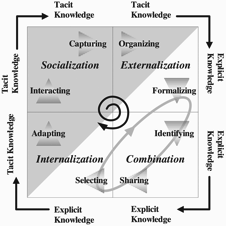2.3.1.1.2.6 Kritische reflectie
Het klinkt zo mooi: kenniswerkers sturen zichzelf en elkaar in flexibele organisaties, zoals Communities of Practice, netwerkorganisaties of een adhocratie (Wenger, Mintzberg), en ontwikkelen zich werkenderwijs tot reflective professionals. In de praktijk is dit ideaal vooralsnog lastig te realiseren. Op basis van een uitvoerige studie, inclusief gedegen literatuur- en eigen empirisch onderzoek, naar het teleurstellende effect van communicatie-onderwijs aan medische professionals, concludeert Wouda (2014): “The implementation of our recommendations would require a great deal of effort. Therefore we doubt whether expertise in professional communication can be fully attained during medical training…. Apparently, an expert level of communication competence in clinical practice is difficult to attain. Especially, the transfer of communication competence acquired in formal learning conditions, into clinical practice appears to be problematic.... The lack of transfer of communication competence acquired in educational settings, into clinical practice is often attributed to the inhibiting influence of clinical culture and supervisors'.... Learning is possible and does occur, however it needs a cultural climate of continuing positive reinforcement of favorable communication behaviour in clinical practice. This condition echoes characteristics that are familiar from psychosomatic patient care or to put it in didactical terms: “Practice what you preach!”
Wouda therefore proposes that the CanMEDS communication competencies should not be regarded as endpoints in medical education but as guidelines to improve communication competency through deliberate practice throughout a professional career.
Deze sugggestie, in combinatie met Aristoteles’ didactische concept van rolinversie, men leert het meest door les te geven, en Polanyi’s opvattingen over tacit knowledge, valt of staat met het vermogen om impliciete kennis te expliciteren. Nonaka & Takeuchi hebben daartoe het SECI-model (socialisatie, externalisatie, combinatie en internalisatie) ontwikkeld.

This means that in order to be successful, individual competency based learning must be organized in the context of a learning organization; above all a curriculum should be build which encourages professionals to improve their behaviour by deliberate practice throughout their professional careers.
Verder met 7. Literatuureferenties